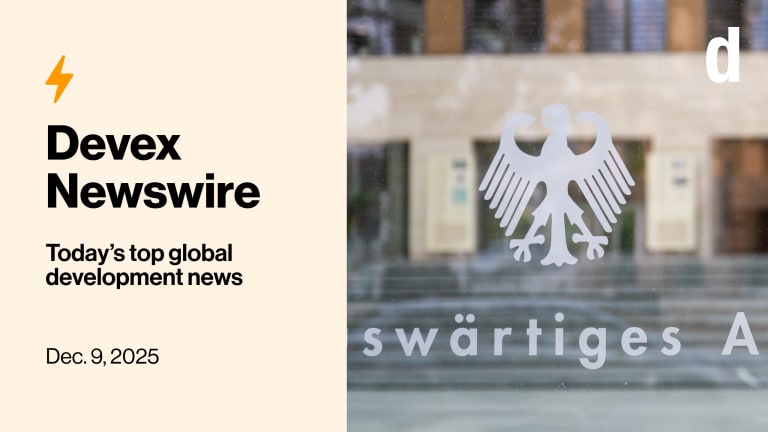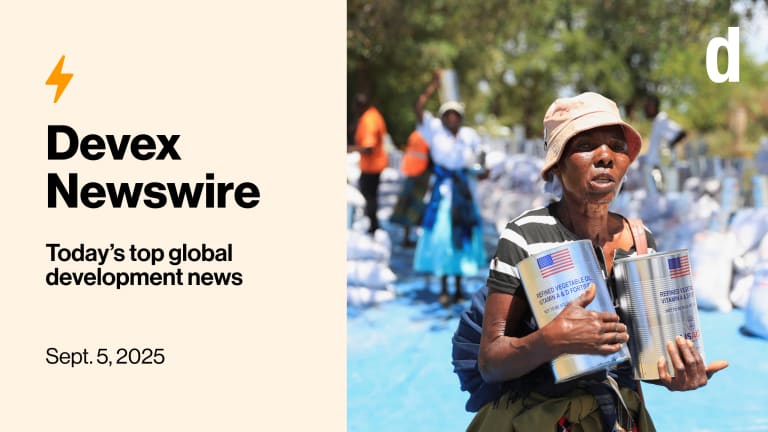Presented by Grant Assistant

The United Kingdom and Germany are set for major foreign aid cuts, to the alarm of NGOs that depend on them for funding. The question is: Can any of the slashing still be avoided?
Also in today’s edition: We look at the not-so-great results of the SDG Gender Index and highlight some of the key jobs being posted in New York.
+ Devex is officially on Telegram and WhatsApp! Join our channels to receive updates on the latest globaldev news directly to your mobile device.
New lows
This is a preview of Newswire
Sign up to this newsletter for an inside look at the biggest stories in global development, in your inbox daily.
U.K. aid spending is about to hit a new low unless the Labour government pulls a rabbit out of its hat, aid groups warn. Bond, the U.K. aid network, crunched the numbers and found that once asylum-seeker costs are factored out, aid will shrink to a mere 0.36% of gross national income in 2024. That’s the lowest proportion since 2007.
Before this summer’s election, Labour had promised a shiny "reset" of development policy — but it appears not. Bond has called on ministers to at least freeze the aid budget at 2023 levels and to find the money spent on refugees and asylum-seekers somewhere other than the aid budget, Bond Director of Policy Gideon Rabinowitz tells Devex. Without intervention, he warns, we’re looking at "unprecedented cuts" that will leave the world’s most vulnerable out in the cold and further tarnish the U.K.’s international reputation.
A hefty £4.3 billion — that’s 27.9% of the U.K.’s aid budget — was absorbed by in-donor refugee costs in 2023, forcing the government to dip into an emergency Treasury cash pot to boost aid spending to 0.58% of gross national income. But that little cash boost ran out in March 2024, and with a £22 billion fiscal hole and soaring asylum expenses, another magic bailout doesn’t seem to be in the cards.
Read: UK aid to hit 17-year low with ‘significant new cuts’ feared
Ein Unglück kommt selten allein
And there’s more — Germany is getting ready to tighten its belt next year too. That’s on top of reductions to its development and humanitarian aid budgets in 2024. The new draft budget is set to chop nearly €1 billion from the Federal Ministry for Economic Cooperation and Development, or BMZ, slashing it to €10.28 billion from €11.22 billion. Humanitarian aid is also taking a hit, with spending set to be more than halved — to just €1.04 billion from €2.23 billion.
Parliament hasn’t rubber-stamped the budget just yet, but insiders say key decisions will be made any day now. Naturally, civil society groups aren’t thrilled, warning that Germany’s role as a leader in tackling global crises is about to take a hit.
Mathias Mogge, head of WeltHungerHilfe, didn’t mince his words: As the world’s third-largest economy, Germany has a duty to step up, not step back, when it comes to global development.
BMZ minister Svenja Schulze is also frustrated with the cuts, “displeased,” in fact, but says that since most of the 2025 budget is already locked in long-term agreements, there’s not much wiggle room left. Short-term programs and Germany’s contribution to multilateral projects are likely on the chopping block. And NGOs? They’re looking at a massive €400 million reduction in transitional aid, which they desperately need to operate in fragile areas.
“For us, this is the most painful reduction,” Mogge says. “Many of the NGOs are working in very fragile contexts and this funding offered the flexibility which we need in these contexts.”
Germany’s aid budget isn’t the only victim here. Overall, the government is slashing €8 billion from its 2025 spending. But the aid-related ministries are taking the hardest hits, largely thanks to the Free Democratic Party’s commitment to sticking to Germany’s "debt brake." And let’s not forget the far-right AfD, which is gaining political ground and pushing hard to redirect foreign aid money to domestic spending.
Still, Mogge and other advocates are holding out hope, seeing a chance to challenge and maybe even reverse some of these cuts before the final budget is signed, sealed, and delivered later this year.
Read more: Germany plans billions in cuts to development, humanitarian aid (Pro)
+ Not yet a Devex Pro member? Start your 15-day free trial today to access all our expert analyses, insider insights, funding data, exclusive events, and more. Check out all the exclusive content available to you.
Equality stalled
Gender equality is grinding to a halt — or worse, sliding backward — in nearly 40% of countries, leaving 860 million women and girls stuck in places ranked “very poor” for economic well-being, education, and health, according to the SDG Gender Index by Equal Measures 2030. Tracking 139 countries across 56 indicators, the index found that not a single nation is on track to meet the 2030 gender equality goals. Not one!
Afghanistan takes the crown for the steepest decline, with more than 70 laws enacted since the Taliban’s takeover in 2021, essentially erasing women from public life. Countries such as Chad, Niger, and Sierra Leone are also scraping the bottom of the rankings, while 1.5 billion women live in nations with “poor” gender equality and another 1.2 billion in places ranked “fair.”
Surprisingly (or maybe not), Costa Rica outpaced the U.S., which plummeted to 40th place after setbacks such as reduced female political participation and the rollback of Roe v. Wade. The U.S. now has the same gender equality score as China.
The report also found that more countries moved backward on gender equality between 2019 and 2022 than in the previous four years, jumping from 10 to 17. Even equality powerhouses such as Canada and the Scandinavian countries showed little to no improvement. At this rate, global gender equality won’t be achieved for nearly a century, with ripple effects that could mess with 74% of the SDG targets.
“We’re stuck in an inequality trap,” Alison Holder, executive director of Equal Measures 2030, says. “The progress is just really, really slow. Absolutely dismal.”
Read: Equality is stalling or backsliding for a billion women and girls (Pro)
The city that never sleeps
As the 79th session of the U.N. General Assembly rolls around in the coming days, New York remains a vital city for those looking to make a meaningful impact in international development.
Over the past year, New York showcased more than 2,000 job listings on the Devex jobs board, ranking just behind Washington, D.C., as the top U.S. destination for global development opportunities.
The U.N. presence in New York is particularly significant, with agencies such as UNICEF and the U.N. Department of Operational Support among the top recruiters. But several notable nonprofit organizations are also shaping the city’s global development landscape.
Devex Career account members can check out what’s on offer. If you’re not a member yet, sign up for a free 15-day trial now to access all the valuable tools you need to be successful in your globaldev job hunt.
Read: Top global development employers in New York (Career)
+ Join us from Sept. 24 to 26 in New York City and online on the sidelines of UNGA 79, Climate Week, and the Summit of the Future for a series of live interviews, networking moments, and conversations. Save your spot now.
In other news
Extreme weather has disrupted education for over 400 million students across 81 countries since 2022, according to a World Bank report. [Nikkei Asia]
India confirmed its first mpox case involved the less severe Clade 2 strain, not the Clade 1 variant driving the current global health emergency. [The Independent]
The U.N. General Assembly granted Palestinians a seat among member states with expanded rights, though voting rights and Security Council membership remain excluded. [Al Arabiya]
Sign up to Newswire for an inside look at the biggest stories in global development.








